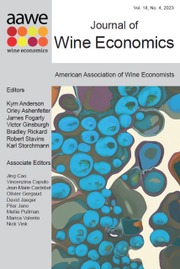Crossref Citations
This article has been cited by the following publications. This list is generated based on data provided by
Crossref.
Ashton, Robert H.
2011.
Improving Experts' Wine Quality Judgments: Two Heads Are Better than One.
Journal of Wine Economics,
Vol. 6,
Issue. 2,
p.
160.
Corsi, Alessandro
and
Strøm, Steinar
2013.
The Price Premium for Organic Wines: Estimating a Hedonic Farm-Gate Price Equation.
Journal of Wine Economics,
Vol. 8,
Issue. 1,
p.
29.
Cuellar, Steven S.
and
Claps, Marianna
2013.
Differential effects of brand, ratings and region on willingness to pay: a hedonic price approach.
Journal of Wine Research,
Vol. 24,
Issue. 2,
p.
138.
Frick, Bernd
and
Simmons, Robert
2013.
The impact of individual and collective reputation on wine prices: empirical evidence from the Mosel valley.
Journal of Business Economics,
Vol. 83,
Issue. 2,
p.
101.
Ashton, Robert H.
2014.
Wine as an Experience Good: Price Versus Enjoyment in Blind Tastings of Expensive and Inexpensive Wines.
Journal of Wine Economics,
Vol. 9,
Issue. 2,
p.
171.
Barisan, Luigino
Boatto, Vasco
Rossetto, Luca
and
Salmaso, Luigi
2015.
The knowledge of Italian wines on export markets.
British Food Journal,
Vol. 117,
Issue. 1,
p.
117.
Ashton, Robert H.
2016.
The Value of Expert Opinion in the Pricing of Bordeaux Wine Futures.
Journal of Wine Economics,
Vol. 11,
Issue. 2,
p.
261.
Dressler, Marc
2016.
Strategic winery reputation management – exploring German wine guides.
International Journal of Wine Business Research,
Vol. 28,
Issue. 1,
p.
4.
Mosedale, Jonathan R.
Abernethy, Kirsten E.
Smart, Richard E.
Wilson, Robert J.
and
Maclean, Ilya M. D.
2016.
Climate change impacts and adaptive strategies: lessons from the grapevine.
Global Change Biology,
Vol. 22,
Issue. 11,
p.
3814.
Winfree, Jason
McIntosh, Christopher
and
Nadreau, Timothy
2018.
An economic model of wineries and enotourism.
Wine Economics and Policy,
Vol. 7,
Issue. 2,
p.
88.
Babin, Barry J.
and
Bushardt, Christian
2019.
Third-party ratings and the US wine market.
International Journal of Wine Business Research,
Vol. 31,
Issue. 2,
p.
151.
Outreville, Jean-François
and
Le Fur, Eric
2020.
Hedonic Price Functions and Wine Price Determinants: A Review of Empirical Research.
Journal of Agricultural & Food Industrial Organization,
Vol. 18,
Issue. 2,
Amédée-Manesme, Charles-Olivier
Faye, Benoit
and
Le Fur, Eric
2020.
Heterogeneity and fine wine prices: application of the quantile regression approach.
Applied Economics,
Vol. 52,
Issue. 26,
p.
2821.
Mendes, Diogo
2020.
Financial Constraints and Product Market Decisions: The Role of Production Cycles.
SSRN Electronic Journal ,
Le Fur, Eric
and
Outreville, J. François
2022.
Do vintage scores by regions matters? The case of French wine regions.
Applied Economics Letters,
Vol. 29,
Issue. 14,
p.
1243.
Castriota, Stefano
Corsi, Stefano
Frumento, Paolo
and
Ruggeri, Giordano
2022.
Does quality pay off? “Superstar” wines and the uncertain price premium across quality grades.
Journal of Wine Economics,
Vol. 17,
Issue. 2,
p.
141.
Kaimann, Daniel
Spiess Bru, Clarissa Laura Maria
and
Frick, Bernd
2023.
Ratings meet prices: The dynamic relationship of quality signals.
Journal of Wine Economics,
Vol. 18,
Issue. 3,
p.
226.
Núñez, Jacobo
Martín‐Barroso, David
and
Velázquez, Francisco J.
2024.
The hedonic price model for the wine market: A systematic and comparative review of the literature.
Agricultural Economics,
Vol. 55,
Issue. 2,
p.
247.
Stöckl, Albert
Tischler, Stephanie
Kleiss, Denise F.
and
Moser, Katharina
2024.
Grapes and gains: the influence of farming methods on Austrian wine ratings and prices.
Journal of Wine Research,
Vol. 35,
Issue. 3,
p.
208.
Le Fur, Eric
Thelisson, Anne‐Sophie
and
Guyottot, Olivier
2024.
Wine prices in economics: A bibliometric analysis.
Strategic Change,
Vol. 33,
Issue. 1,
p.
41.


